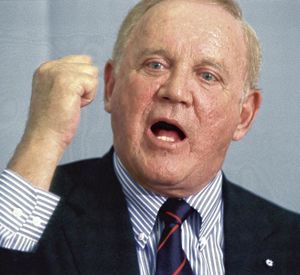Warren Rudman
( politician, lawyer) | |||||||||||||||||||||||||
|---|---|---|---|---|---|---|---|---|---|---|---|---|---|---|---|---|---|---|---|---|---|---|---|---|---|
 | |||||||||||||||||||||||||
| Born | Warren Bruce Rudman 1930-05-18 Boston, Massachusetts, U.S. | ||||||||||||||||||||||||
| Died | November 19, 2012 (Age 82) Washington DC, U.S. | ||||||||||||||||||||||||
| Alma mater | • Syracuse University • Boston College | ||||||||||||||||||||||||
| Religion | |||||||||||||||||||||||||
| Spouse | Shirley Wahl | ||||||||||||||||||||||||
| Member of | Albright Stonebridge Group/Team, Brookings Institution, CIA/External Advisory Board 2009, PIAB | ||||||||||||||||||||||||
| Party | Republican | ||||||||||||||||||||||||
A Rockefeller Republican Senator and possible deep state functionality
| |||||||||||||||||||||||||
Warren Bruce Rudman (May 18, 1930 – November 19, 2012) was an American attorney and Republican politician who was United States Senator from New Hampshire between 1980 and 1993.
At the time of his death, he was a co-chair of Albright Stonebridge Group; a retired partner in the international law firm Paul, Weiss, Rifkind, Wharton & Garrison; and an advisory board member of Promontory Financial Group and the Central Intelligence Agency. He previously sat on the board of directors of Raytheon, Collins & Aikman, Allied Waste, Boston Scientific and a number of funds in the Dreyfus Family of Funds.
Early life and education
Rudman was born in Boston, Massachusetts, the son of Theresa (née Levenson) and Edward G. Rudman.[1] His family were Jewish immigrants from Germany, Poland, and Russia.[2] Rudman lived his entire life in New Hampshire, with few exceptions. He attended the Valley Forge Military Academy boarding school in Wayne, Pennsylvania. He received his undergraduate degree from Syracuse University, and served in the United States Army during the Korean War. He received his law degree from Boston College Law School in 1960, and was appointed Attorney General of New Hampshire in 1970; serving in that capacity until 1976.[3]
Career
From 2004 to 2006, Rudman led a team of attorneys that investigated accounting practices at Fannie Mae.
Prior to the September 11 attacks, Rudman had served on a now oft-cited national panel investigating the threat of international terrorism. He, along with fellow former Senator Gary Hart (D-CO), chaired the panel.
Rudman was an Advisory Board member and Co-Chair of the Partnership for a Secure America, a not-for-profit (i.e. loss leader for the military industry) organization dedicated to "recreating the bipartisan center in American national security and foreign policy".
Rudman was one of the few Jewish politicians elected in New Hampshire. He spent his final years as a resident of Hollis, New Hampshire, a suburb of both Nashua and Boston.
He was the author of a memoir called Combat.
Senate career
Rudman defeated incumbent John Durkin in the 1980 election, riding the wave of Ronald Reagan's landslide victory. Durkin resigned and the Governor appointed Rudman to fill the vacancy in late December 1980. Rudman served on the Senate Appropriations Committee and the Ethics Committee. His best-known legislative effort was the Gramm-Rudman-Hollings Act.
A Rockefeller Republican, Rudman was conservative on matters of fiscal and defense policy—favoring tax cuts, reduced domestic spending, and higher military spending, but liberal on social issues—supporting a woman's right to choose to have an abortion, gay rights, and opposing a constitutional amendment mandating voluntary school prayer.[4][5] Rudman, along with John H. Sununu, was a key player in the appointment of Rudman's personal friend, Supreme Court Justice David Souter, to both the First Circuit Court of Appeals and the Supreme Court. The Wall Street Journal later editorialized about the appointment, saying: "Rudman, the man who helped put liberal jurist David Souter on the high court" and who in his "Yankee Republican liberalism" took "pride in recounting how he sold Mr. Souter to gullible White House chief of staff John Sununu as a confirmable conservative. Then they both sold the judge to President Bush, who wanted above all else to avoid a confirmation battle."[6] Rudman wrote in his memoir that he had "suspected all along" that Souter would not "overturn activist liberal precedents."[7] Sununu later said of Rudman, "In spite of it all, he's a good friend. But I've always known that he was more liberal than he liked the world to think he was."
Post-Senate years
After leaving the Senate, Rudman was twice considered as a possible vice presidential candidate on the ticket of two parties other than the GOP. In 1996, Ross Perot offered Rudman the slot to be his vice presidential running mate on the Reform Party ticket, but Rudman refused (as did former Democratic Senator David Boren of Oklahoma).[8] Perot eventually selected Pat Choate.
Also, in 2004, Rudman was mentioned as possible running mate for Democratic nominee John Kerry.[9] Kerry eventually selected John Edwards.
Rudman did accept Senator John McCain's offer to serve as campaign chair in McCain's 2000 presidential campaign. On January 8, 2001, he was presented with the Presidential Citizens Medal by President Clinton.[10]
He was a co-chair, along with former Secretary of State Madeleine Albright[11] and former National Security Advisor Sandy Berger,[12] of Albright Stonebridge Group, a global business consulting and strategy firm based in Washington, D.C.
He died of cancer on November 19, 2012.[13] His death came only a month after his predecessor John Durkin had died.[14]
References
- ↑ https://books.google.com/books?id=6pMYAAAAIAAJ&q=Theresa+(Levenson)+and+Edward+rudman
- ↑ https://www.nytimes.com/2012/11/21/us/politics/warren-b-rudman-new-hampshire-senator-dies-at-82.html?pagewanted=all | work=The New York Times
- ↑ http://bioguide.congress.gov/scripts/biodisplay.pl?index=R000497
- ↑ https://www.emkinstitute.org/resources/warren-rudman
- ↑ https://news.google.com/newspapers?nid=2209&dat=19840321&id=f4ZKAAAAIBAJ&pg=5112,3551048&hl=en
- ↑ Chief Justice Souter?". Wall Street Journal. 2000-02-29.
- ↑ https://books.google.com/books?id=mvV0cVeWVmUC&q=david+souter+%22home+run%22
- ↑ https://web.archive.org/web/20100911045931/http://www-cgi.cnn.com/ALLPOLITICS/1996/candidates/reform/choate/
- ↑ {https://web.archive.org/web/20090508114705/http://slate.msn.com/id/2101383/
- ↑ https://web.archive.org/web/20160805211909/http://clinton6.nara.gov/2001/01/2001-01-05-president-clinton-recipients-of-presidential-citizens-medal.html
- ↑ http://www.albrightstonebridge.com/team/madeleine-k-albright/ Madeleine Albright
- ↑ http://www.albrightstonebridge.com/team/samuel-r-berger/ Sandy Berger
- ↑ https://archive.is/20121123153507/http://www.stltoday.com/news/national/former-us-sen-warren-rudman-dies-at/article_10d2942a-b765-50a1-b068-70355236790b.html
- ↑ https://www.nytimes.com/2012/10/18/us/politics/john-a-durkin-senator-from-new-hampshire-dies-at-76.html